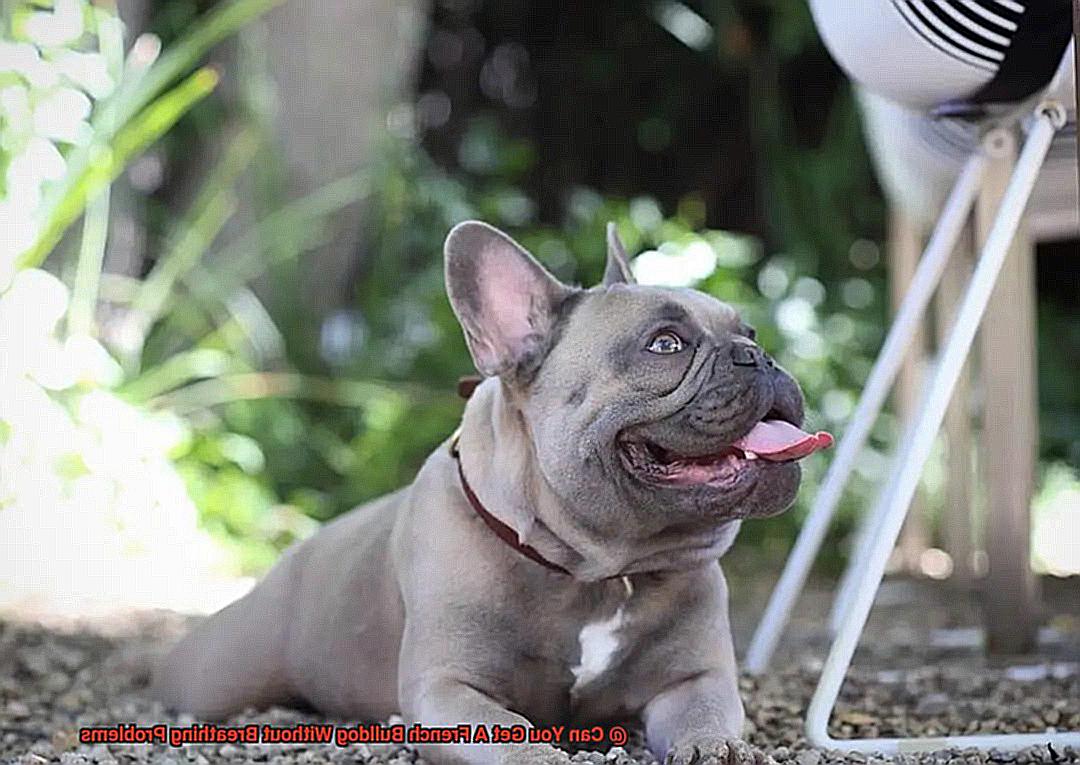Can You Get A French Bulldog Without Breathing Problems?
French Bulldogs, with their adorable squished faces, cute ears that resemble bats, and lovable personalities, have stolen the hearts of dog enthusiasts everywhere. But if you’re thinking about bringing a French Bulldog into your family, you might be worried about their notorious breathing issues.
Now, hold on to your hats because we’re about to debunk the myth that all French Bulldogs are destined to have breathing problems. Yes, it’s true that they can be prone to respiratory troubles, but there is hope for those who want a French Bulldog without compromising their furry friend’s health.
In this blog post, we’ll explore this topic with an optimistic outlook and dive into the possibility of finding a French Bulldog without breathing problems. We’ll shed light on responsible breeding practices and give you valuable insights into the genetic and environmental factors that contribute to breathing issues in this particular breed.
But wait, there’s more. We’ll also discuss essential factors like choosing a reputable breeder, ensuring proper exercise and weight management for your pup, and creating an environment that supports their well-being. Our aim is to arm you with knowledge so that you can make an informed decision when searching for your perfect French Bulldog companion.
So buckle up and get ready to join us on this educational journey as we explore the world of French Bulldogs without breathing problems. It’s time to separate fact from fiction and find out what lies beyond the smushy face stereotype.
Brachycephalic Airway Syndrome: The Most Common Cause of Respiratory Issues in French Bulldogs
Contents
- 1 Brachycephalic Airway Syndrome: The Most Common Cause of Respiratory Issues in French Bulldogs
- 2 Choosing the Right Breeder to Minimize the Risk of Breathing Problems
- 3 Maintaining a Healthy Weight to Reduce Respiratory Issues
- 4 Environmental Factors That Can Affect Your Dog’s Breathing
- 5 Regular Veterinary Check-Ups for Monitoring Respiratory Health
- 6 Specialized Harnesses and Collars That Promote Better Airflow
- 7 Genetics and Other Factors That May Reduce the Risk of Respiratory Issues
- 8 Conclusion
We all adore these cute and friendly pups, but let’s face it – their adorable looks come with a price. French Bulldogs are notorious for their breathing difficulties, and that’s because of a condition called Brachycephalic Airway Syndrome (BAS). In this article, we’ll explore why BAS is the leading cause of respiratory issues in French Bulldogs and what you can do to help your furry friend breathe easier.
Understanding Brachycephalic Airway Syndrome:
Brachycephalic Airway Syndrome is a collection of respiratory conditions and anatomical abnormalities commonly found in brachycephalic breeds, including our beloved French Bulldogs. These pups have a distinct head shape characterized by a short, wide skull and a pushed-in face, which contributes to their breathing woes.
Anatomical Abnormalities Associated with BAS:
Let’s talk about the specific anatomical abnormalities that contribute to BAS in French Bulldogs:
- Stenotic Nares (Narrowed Nostrils): French Bulldogs often have narrow nostrils, making it difficult for them to get enough air through their nose.
- Elongated Soft Palate: The soft palate at the back of a French Bulldog’s throat can be longer than normal, partially blocking their airway and causing snorting or gagging sounds.
- Hypoplastic Trachea (Narrowed Windpipe): The windpipe in French Bulldogs may be narrower than usual, making it harder for them to breathe freely.
- Everted Laryngeal Saccules: These small structures within the larynx can become inflamed and protrude into the airway, further obstructing airflow.


Symptoms of BAS:
Now that we understand the anatomical abnormalities associated with BAS, let’s look at the common symptoms you might notice in your French Bulldog:
- Snoring: French Bulldogs are known for their snoring, which can be cute but also a sign of breathing difficulties.
- Noisy Breathing: If your Frenchie makes loud, raspy, or wheezing sounds when breathing, it could indicate a compromised airway.
- Exercise Intolerance: Difficulty keeping up during playtime or showing signs of exhaustion quickly may be due to inadequate oxygen intake.
- Shortness of Breath: Rapid breathing, panting excessively, or struggling to catch their breath are all signs of respiratory distress.
- Collapse: In severe cases, French Bulldogs with BAS may collapse due to a lack of oxygen.
Managing BAS in French Bulldogs:
While we can’t eliminate the risk of breathing problems entirely, we can take steps to minimize the severity of BAS in our French Bulldogs:
Choosing the Right Breeder to Minimize the Risk of Breathing Problems
If you’re considering bringing a French bulldog into your home, it’s essential to choose a reputable and responsible breeder to minimize the risk of breathing problems in your new puppy. Here are some tips to help you find the right breeder:
- Health screenings and tests: Look for a breeder who conducts health screenings and tests on their breeding dogs. This includes evaluations for respiratory issues like Brachycephalic Airway Syndrome (BAS) and elongated soft palate (ESP). The breeding dogs should also be screened for other genetic health conditions that can contribute to breathing problems.
- Documentation of health tests: A responsible breeder will provide documentation of these health tests, issued by recognized veterinary professionals. This allows potential buyers to verify the health status of the breeding dogs and ensure they are free from breathing problems.
- Breeding practices: Consider the breeding practices of the breeder. Breeding French bulldogs with a focus on promoting healthy respiratory function involves selecting dogs with proper conformation and avoiding extreme physical traits that can exacerbate breathing issues. Look for breeders who prioritize moderate muzzle length, well-open nostrils, and a clear airway in their dogs.
- Socialization and care: A reputable breeder will prioritize socialization and proper care for their puppies. Ensure that the puppies are raised in a clean and stimulating environment, receiving appropriate veterinary care and vaccinations. Exposure to various stimuli helps them adapt to different situations and reduce stress, which can contribute to breathing difficulties.
- Visit the facilities: If possible, visit the breeder’s facilities in person. Observe the conditions in which the dogs are kept to gain insights into the breeder’s practices. Clean living spaces, adequate exercise opportunities, and proper nutrition are signs of a responsible breeder.
- Breeder’s knowledge: Ask the breeder about their experience and knowledge regarding breeding French bulldogs without breathing problems. A knowledgeable breeder will be able to discuss the specific health concerns of the breed and explain how they work to minimize these risks through their breeding program.

Maintaining a Healthy Weight to Reduce Respiratory Issues
French bulldogs are known for their cute faces and unique snouts, but their adorable features can also come with respiratory challenges. Their short snout and compact airways make them more prone to breathing issues. One way to help reduce these problems is by maintaining a healthy weight for your furry friend. In this article, we’ll explore why weight management is crucial for French bulldogs and provide practical tips to keep them breathing easy.
Why Weight Matters:
Extra pounds can put pressure on your French bulldog’s airways, making it harder for them to breathe comfortably. This can lead to labored breathing, wheezing, and snorting sounds. In severe cases, it can even result in life-threatening conditions like laryngeal collapse or heatstroke. By keeping your French bulldog at a healthy weight, you can help alleviate these respiratory issues and improve their overall quality of life.
Tips for Maintaining a Healthy Weight:
Balanced Diet:
Consult with your veterinarian to determine the appropriate portion sizes and types of food for your French bulldog’s specific nutritional needs. Avoid overfeeding and opt for high-quality dog food that meets their dietary requirements without excess calories.
Regular Exercise:
While French bulldogs may not be the most athletic breed, they still need daily physical activity to burn calories and maintain muscle tone. Take them for short walks, engage in playtime, and provide interactive toys to keep them active and prevent excessive weight gain.
Monitor Body Condition Score:

Keep track of your French bulldog’s body condition score, which assesses their overall body fat percentage. Your veterinarian can help you determine the ideal score for your dog and guide you on how to achieve and maintain it.
Gradual Changes:

If your French bulldog is already overweight, don’t worry. It’s never too late to make positive changes. Gradually reduce their food intake while ensuring they still receive all necessary nutrients. Increase their exercise gradually, taking their age and any existing health conditions into consideration.
Environmental Factors That Can Affect Your Dog’s Breathing
French Bulldogs are adorable and lovable pets, but their unique physical characteristics make them more susceptible to breathing difficulties. As a responsible pet owner, it’s essential to understand the environmental factors that can impact your French Bulldog’s breathing. In this article, we will explore some of these factors and provide valuable insights to help you keep your furry friend breathing easy.
Temperature and Humidity:
French Bulldogs are known for their sensitivity to extreme temperatures. High humidity levels can make it harder for them to cool down, leading to respiratory distress. On the other hand, cold temperatures can cause their airways to constrict, making breathing more challenging. Ensure your French Bulldog has access to shade and fresh water in hot weather and consider using cooling mats or vests. In colder climates, provide a warm and comfortable environment for them.
Pollution and Air Quality:
French Bulldogs have shorter snouts and narrower airways, making them more susceptible to respiratory issues when exposed to pollution. Avoid walking your dog near heavy traffic areas or during times of poor air quality, such as smoggy days or when there are wildfires nearby. It’s also important to keep your home environment clean and free from dust, smoke, and chemical fumes.
Allergens:
Just like humans, dogs can be allergic to various environmental allergens. Pollen, mold spores, dust mites, and certain grasses or plants can trigger respiratory symptoms in French Bulldogs.
Try to identify and minimize your dog’s exposure to these allergens by keeping them indoors during peak pollen seasons or using air purifiers in your home.
Irritants:
Certain substances found in household products, cleaning agents, perfumes, and even some plants can act as irritants for your French Bulldog’s respiratory system. Make sure to use pet-friendly and non-toxic cleaning products in your home and keep harmful plants out of your dog’s reach.
Exercise and Activity Level:
While exercise is essential for a French Bulldog’s overall health, overexertion or strenuous activity can lead to excessive panting and breathing difficulties. Avoid intense exercise during hot weather or when your dog seems tired. Provide regular but moderate exercise sessions, allowing ample rest and recovery time.
Sufficient Rest:
French Bulldogs, like all dogs, need sufficient rest to maintain good respiratory health. Dogs that are constantly on the move without enough downtime can experience breathing problems due to fatigue. Ensure your French Bulldog has a quiet and comfortable space where they can relax and recharge.
Secondhand Smoke:
Exposure to secondhand smoke can irritate your French Bulldog’s airways and lead to breathing problems. Keep your dog away from areas where smoking occurs and avoid exposing them to secondhand smoke.
Regular Veterinary Check-Ups for Monitoring Respiratory Health
Regular veterinary check-ups are a must to ensure the respiratory health of our lovable French Bulldogs. These adorable creatures have a unique brachycephalic skull shape that affects their airways, making them prone to respiratory issues. As responsible pet owners, we need to prioritize these regular visits to give our furry friends the care and attention they need. During these check-ups, veterinarians carefully assess the French Bulldog’s breathing patterns, listen for any abnormal sounds in their lungs, and keep an eye out for signs of respiratory distress.
But it doesn’t stop there. To get a more detailed assessment of your French Bulldog’s respiratory health, additional diagnostic tests such as x-rays or blood work may be performed. X-rays can reveal any structural abnormalities or signs of inflammation that may be affecting the airways, while blood work can help identify underlying conditions that contribute to respiratory issues. By performing these tests, veterinarians can gather valuable information about your dog’s respiratory system and make informed decisions about their treatment and care.
The real value of regular check-ups lies in their ability to detect early signs of respiratory problems. Identifying these issues at an early stage allows for timely intervention and management. With proper care and treatment, the progression of respiratory problems can be slowed down or even prevented entirely. This ultimately leads to an improved quality of life for our beloved French Bulldogs.
The frequency of veterinary check-ups may vary depending on factors such as the dog’s age and overall health status. Puppies may require more frequent visits to monitor their growth and development, including the maturation of their respiratory system. Older dogs or those with pre-existing respiratory conditions may also need more frequent monitoring to ensure their respiratory health is well-managed.
In addition to regular veterinary check-ups, it is essential for owners to be vigilant about observing any changes in their dog’s breathing patterns or behavior. If you notice anything out of the ordinary, such as increased difficulty breathing or excessive coughing, it is crucial to report these symptoms to your veterinarian promptly. Early detection and intervention are key to providing the best care for your French Bulldog.
Specialized Harnesses and Collars That Promote Better Airflow
Specialized Harnesses and Collars That Promote Better Airflow for French Bulldogs
As loving owners of French Bulldogs, it’s important for us to understand the unique challenges they face when it comes to breathing. Their adorable brachycephalic (short-nosed) structure can unfortunately lead to respiratory issues and difficulty breathing. But fear not. There are specialized harnesses and collars available that can help promote better airflow and alleviate these problems.
Traditional collars, while they may look stylish, can actually put pressure on the neck and throat area, making it even harder for our Frenchies to breathe. That’s where specialized harnesses and collars come in. They are designed with features specifically tailored to the needs of brachycephalic breeds like French Bulldogs.
Let’s take a closer look at how these specialized products work their magic:
- Wide Straps: These harnesses and collars have wider straps that distribute pressure more evenly across the chest and shoulders. This helps to reduce any strain on the neck and throat area, allowing for easier breathing.
- Padded Materials: The use of padded materials adds an extra layer of comfort for our furry friends. Not only does it prevent any potential chafing or discomfort, but it also helps to further distribute pressure in a gentle and supportive manner.
- Adjustable Straps: A snug fit is essential for a harness or collar to be effective, but we also want to ensure that it doesn’t constrict our French Bulldogs’ airway. Specialized harnesses and collars have adjustable straps, allowing for a customized fit that is both secure and comfortable.
- Front Attachment Point: Some specialized harnesses feature a front attachment point. This serves two purposes: redirecting the dog’s pulling force and encouraging them to walk beside their owner instead of pulling ahead, as well as preventing strain on the neck and throat area. By reducing the risk of strain, we can help minimize breathing difficulties.
- Back Handle: Harnesses with a handle on the back provide an additional level of support and assistance. This is especially useful in situations where our French Bulldogs may need a little extra help, such as navigating stairs or getting in and out of vehicles.
When selecting a specialized harness or collar for your French Bulldog, it’s crucial to choose products specifically designed for brachycephalic breeds. These products take into consideration their unique anatomy and respiratory needs. Consulting with a veterinarian or professional dog trainer can also be helpful in ensuring the proper fit and functionality of the chosen harness or collar.
Genetics and Other Factors That May Reduce the Risk of Respiratory Issues
French Bulldogs are adorable and lovable pets, but their unique physical features can make them more prone to respiratory issues. However, by understanding the genetics and implementing certain factors, you can reduce the risk of respiratory problems in your furry friend.
Genetics: Responsible Breeding
- Select breeding pairs with a clean health history to prevent passing on respiratory issues.
- Genetic screening can identify potential respiratory problems in breeding dogs, aiding informed decision-making.
Environmental Factors: Care and Management
- Regular exercise helps maintain a healthy weight, reducing strain on the respiratory system.
- Keep your French Bulldog’s living space cool and well-ventilated to prevent overheating.
- Maintain a clean environment, free from irritants like smoke and dust.
Veterinary Care: Early Detection and Intervention
- Regular check-ups with a veterinarian are crucial for monitoring respiratory health.
- Professionals can assess breathing patterns, weight, and perform tests to prevent complications.
Specialized Harnesses and Collars:
- Utilize specially designed harnesses and collars that distribute pressure evenly, offering comfort.
- These accessories can also redirect pulling forces and provide a handle for tricky situations.
Em5WE9QFfa0″ >
Conclusion
In conclusion, it is possible to find a French bulldog without breathing problems. By carefully selecting a reputable breeder who prioritizes the health and well-being of their dogs, you can increase your chances of getting a French bulldog with fewer respiratory issues. It’s essential to ask questions about the breeder’s breeding practices, including any efforts they make to reduce the risk of breathing problems in their puppies.
Additionally, consider choosing a French bulldog with a longer snout. The shorter snouts are often associated with more breathing difficulties due to their narrow airways. Opting for a dog with a slightly longer snout can help mitigate potential respiratory issues.
Regular veterinary check-ups and proper care are also crucial in maintaining your French bulldog’s overall health. Regular exercise, weight management, and avoiding extreme temperatures can all contribute to reducing breathing problems in this breed.
Remember, owning any dog comes with responsibilities, and being aware of potential health concerns is part of being a responsible pet owner. By taking proactive steps and making informed choices, you can increase the likelihood of finding a French bulldog that will bring joy and companionship without significant breathing problems.




